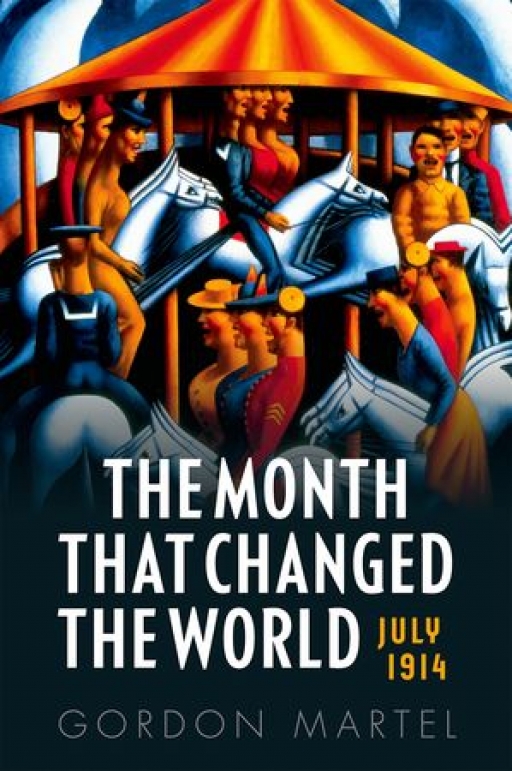Publisher’s Description
“On 28 June 1914 the Austrian Archduke Franz Ferdinand was assassinated in the Balkans. Five fateful weeks later the Great Powers of Europe were at war.
Much time and ink has been spent ever since trying to identify the ‘guilty’ person or state responsible, or alternatively attempting to explain the underlying forces that ‘inevitably’ led to war in 1914. Unsatisfied with these explanations, Gordon Martel now goes back to the contemporary diplomatic, military, and political records to investigate the twists and turns of the crisis afresh, with the aim of establishing just how the catastrophe really unfurled.
What emerges is the story of a terrible, unnecessary tragedy – one that can be understood only by retracing the steps taken by those who went down the road to war. With each passing day, we see how the personalities of leading figures such as Kaiser Wilhelm II, the Emperor Franz Joseph, Tsar Nicholas II, Sir Edward Grey, and Raymond Poincaré were central to the unfolding crisis, how their hopes and fears intersected as events unfolded, and how each new decision produced a response that complicated or escalated matters to the point where they became almost impossible to contain.
Devoting a chapter to each day of the infamous ‘July Crisis’, this gripping step by step account of the descent to war makes clear just how little the conflict was in fact premeditated, preordained, or even predictable. Almost every day it seemed possible that the crisis could be settled as so many had been over the previous decade; almost every day there was a new suggestion that gave statesmen hope that war could be avoided without abandoning vital interests.
And yet, as the last month of peace ebbed away, the actions and reactions of the Great Powers disastrously escalated the situation. So much so that, by the beginning of August, what might have remained a minor Balkan problem had turned into the cataclysm of the First World War”.
Centenary News Review
Reviewed by: Alan Paton
This book is especially good at highlighting the political disarray of the Triple Alliance (Germany, Austria-Hungary, an Italy) from the assassinations in Sarajevo to the first few days of August when Germany was at war with Russia, France and Britain, and Austria-Hungary was at war with Serbia only, and Italy was neutral.
The author adds extra human interest with numerous mini-portrayals of the main characters, giving insights to their personalities and interesting details. (e.g., Cambon, the French ambassador in Berlin, was married to the sister of Paleologue, French ambassador in St Petersburg.)
The book is a clear and fast moving narrative of the assassination plot, Europe’s reaction, a day by day account of the critical period Friday, the 24 July, the day after the delivery of the ultimatum to Serbia, to the Friday, the 31 July, and the final days of decision the 1 – 4 August.
Another big plus (in the opinion of this reviewer) is the author’s stance on the causes of the war. After a brief but informative account of how views on the causes of the war have changed, from early in the war itself, when people felt that they had been overwhelmed by forces beyond human control, through Albertini’s masterful account and the Fischer controversy to recent decades, he places “human agency” firmly in the frame. And, it was not a pre-meditated war.
The author takes a particular line on a number of questions that are still debated. (I won’t say what line!) Did the Entente powers have any suspicion that Austria-Hungary would make unacceptable demands on Serbia? Did the Russians and French discuss the worst case possibility, one which threatened military action, and decide what they would do in that event? Did the Serbs genuinely accept all of the Austro-Hungarian demands save two? When did the Russians make clear to the Serbs that they would support them with military action if necessary? Did the French seriously try to restrain the Russians? Was a peaceful solution still possible on Saturday, the 1st August when Germany declared war on Russia because it would not stop its mobilisation?
The book doesn’t get five stars because of a number of oddities. The sequence and content of the Sazonov/Szapary/Pourtales/meetings on the 26-27 July looks wrong. The three distinct British mediation proposals are rolled into one recurring mediation idea. It says at one point the Austro-Hungarians planned to deliver the ultimatum to Serbia as the French president left for St Petersburg which goes against the idea they did not want the French and Russians to co-ordinate their response. It is correct the Austro-Hungarians added payment for mobilisation to their demands on Serbia but they did not do this until after war had been declared, not as the book suggests before delivery of the ultimatum. Austria-Hungary declares general mobilisation on Tuesday, the 28 July, and then again on Friday, the 31 July!
What do you think about this book? Please add a comment below.
